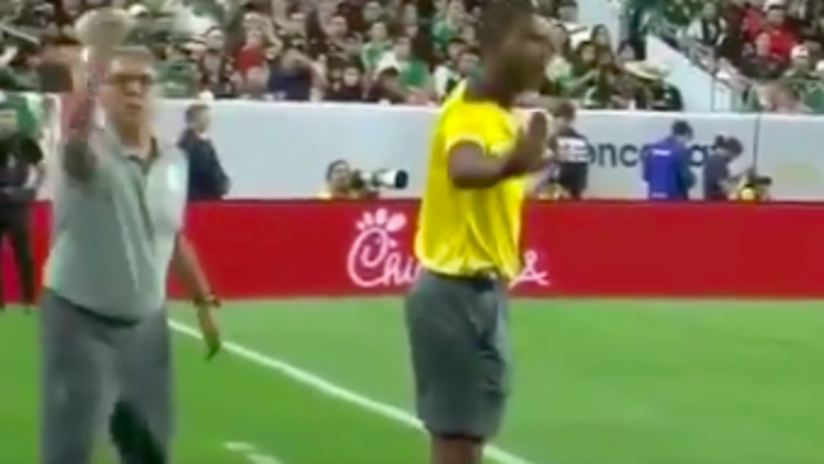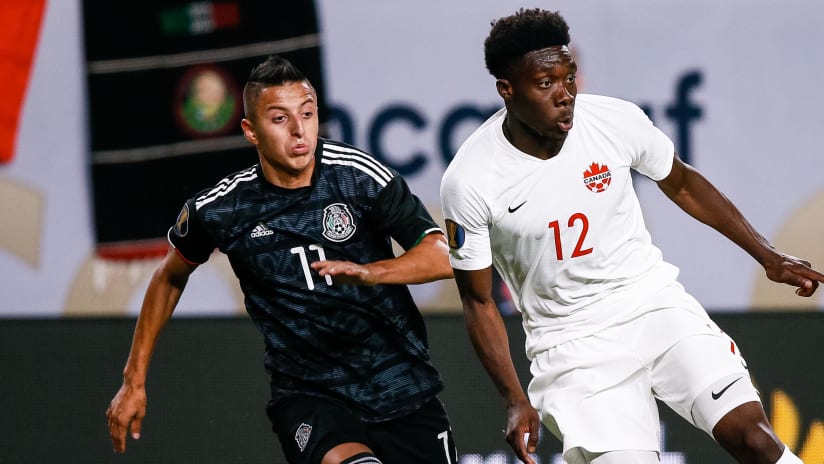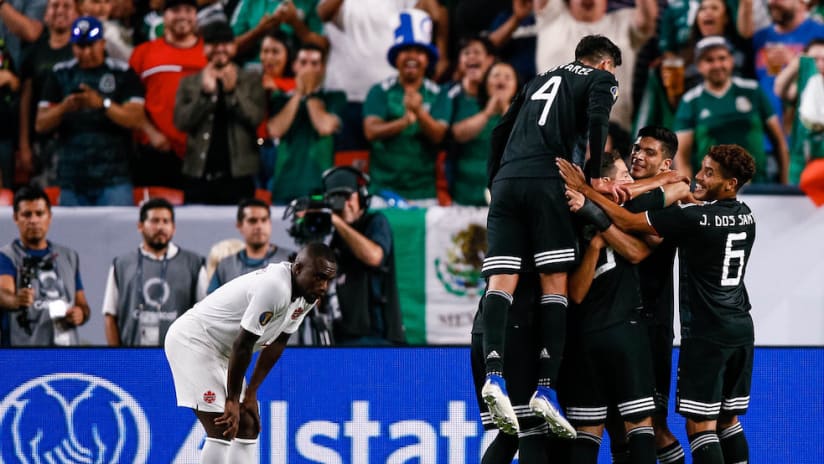Three years ago, Canada very nearly caught Mexico completely off guard – but that won’t happen again on Wednesday night (10:30 pm ET | FS1, Univision, UDN, TSN).
For some context ahead of their upcoming Concacaf Gold Cup showdown, let’s take a brief trip down memory lane, back to March 2016.
El Tri were visiting Vancouver for the first of two consecutive FIFA World Cup qualifiers the teams would play over the course of five days. The opponent, and the stakes, had drawn a raucous, pro-Canadian crowd of nearly 55,000 to BC Place.
Mexico came in on the heels of a solid 3-0 home win over El Salvador and a 2-0 road win at the cauldron in San Pedro Sula, Honduras. Canada, meanwhile, had pieced together a scoreless draw in El Salvador and a 1-0 home win over Honduras on Cyle Larin’s infamous “butt goal.”
The goal is precisely as the name suggests: a ball that bounced into the net off of Larin’s backside, unbeknownst to the striker as he fell to the turf after missing a flying header. The ugly, unintentional tally was perfectly emblematic of the Canadian team at the time – seemingly incapable of scoring except through some ludicrous confluence of unexpected events.

Marco Fabian and Dejan Jakovic clash during a 2016 match at BC Place | USA Today Sports
Sure, they’d posted a number of decent score lines in the preceding months against the likes of Puerto Rico, Dominica and Belize. But up against more challenging continental competition in World Cup qualifying, sturdy defense was generally considered their only real prayer for advancement.
So, with Canada staring down a massive crowd and a massive opponent in March 2016, many suspected Les Rouges to employ the tactical equivalent of curling up into the fetal position and pulling a thick blanket over their heads. But then something strange happened.
The Canadians didn’t bunker. They opened up. They moved forward. They, if not for some troublesome finishing – could have gained an early lead, which may have changed their entire qualifying campaign.
However, as the game wore on, Mexico took advantage of Canada’s self-imposed vulnerabilities, slicing and dicing their way to a 3-0 win. Four days later, at the Estadio Azteca, Canada assumed a more predictable defensive posture, holding the home side to a 2-0 margin and prompting derisive boos at the final whistle, surely from fans at the Mexican team who had expected a lopsided score.
Now, here we sit in 2019, with Canada and Mexico having won their Gold Cup openers by a combined 11-0 score, and precisely nobody will be surprised in the slightest to see Canada come out with some teeth in their attack this time out.
This is, of course, a radically different Canadian side than the one manager Benito Floro brought into those matches against Mexico back in 2016.
That 3-0 loss at BC Place was just Junior Hoilett’s fourth match in a Canadian jersey, and Scott Arfield’s first. These days, Arfield is playing the finest football of his life for both club and country, and both he and Hoilett scored in Saturday’s 4-0 win over Martinique.
Canada’s other two goals came off the boot of 19-year-old Jonathan David, whose ice-cold (in a good way) finishing touch is opening eyes across the continent. Lucas Cavallini and Jonathan Osorio both hit new heights during the prime of their club careers after tough spells with the CanMNT.
And, oh yeah, there’s also Alphonso Davies of Bayern Munich. You may have heard of him.
On the other end of the pitch, there’s also a whole new Canadian reality: defense is a big question mark.

Uriel Antuna had a hat-trick for Mexico in their 2019 Gold Cup opener | USA Today Sports
Against Martinique, Herdman deployed a makeshift back line of Atiba Hutchinson (customarily a central midfielder), Mark-Anthony Kaye (also customarily a central midfielder), Marcus Godinho (earning just his second national-team cap) and Derek Cornelius. They, with a generous helping hand from goalkeeper Milan Borjan, kept their non-FIFA opponents off the score sheet, but a Mexican side that dropped seven goals on Cuba that same day will be a whole other story.
Doneil Henry, Dejan Jakovic and Manjrekar James all held relatively solid under the pressure of playing at the Azteca back in 2016. Jakovic and James were both left off the 23-man squad for this year’s Gold Cup, and Henry didn’t start against Martinique.
Henry could be back in against Mexico alongside Cornelius, with whom he’s built familiarity with both club (Vancouver Whitecaps) and country in the past 12 months. But where does that leave Hutchinson, the 36-year-old stalwart whose poise and on-field experience simply can’t be replicated?
Perhaps his spot is on the bench on this occasion, as Herdman looks ahead to Sunday’s match against Cuba as the more realistic must-win for his side. Even in its rejuvenated form, Canada still comes in as underdogs against Mexico, who would realistically clinch Group A with a draw.
But perhaps that’s the best position of all for Canada to find itself in, with nothing much to lose and going toe-to-toe with the regional juggernaut. For much of this decade, as Canada scraped and clawed its way to one 0-0 or 1-0 result after another, many fans clamored for a team that would play proactively, even if it meant a final score of 5-3 or 6-4.
A few years after an initial glimpse at what Canada-Mexico could truly hold, those folks might finally get their wish.













